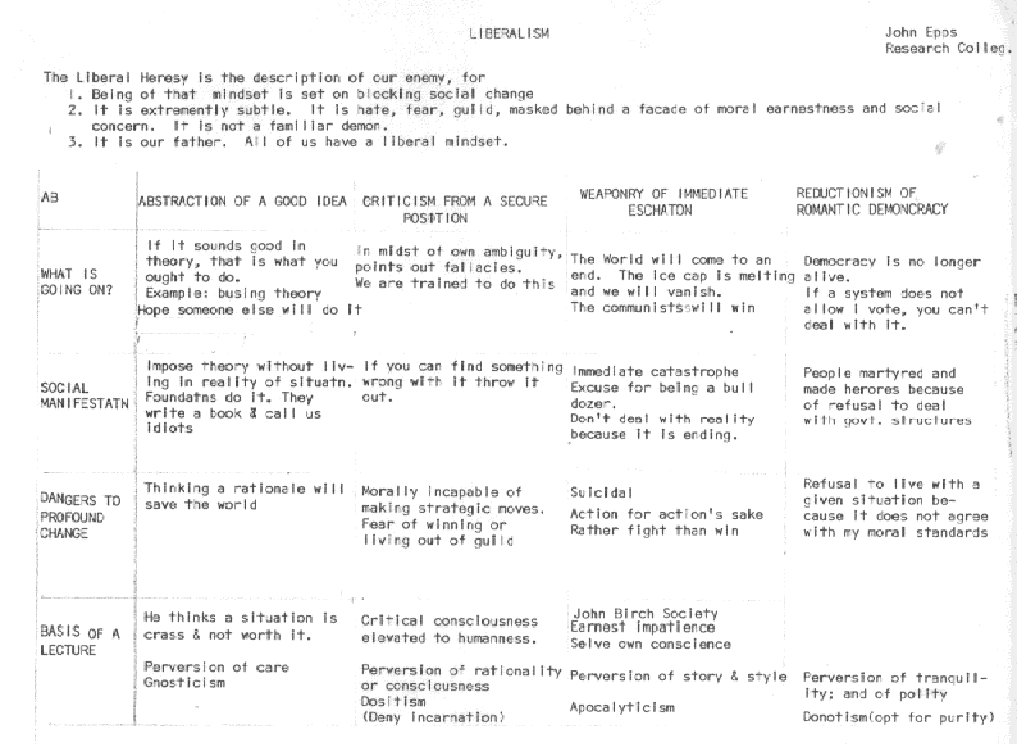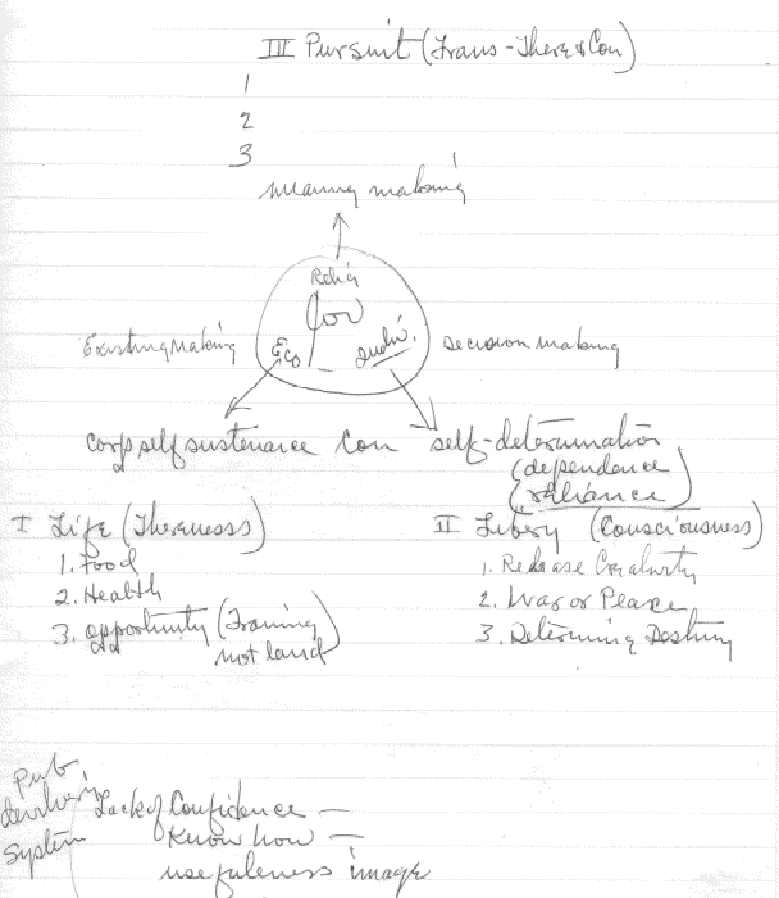
Global Research Assembly
Chicago Nexus
July 1976
Anyone who has been caught up in the great drive
for renewal which characterizes our time will know that there
are forces which work against him. There is something that does
not like resurgence, that tries to defeat new life, that is out
to destroy anything that speaks of hope or vitality of a human
future. However mild or friendly he may be he finds himself in
a life and death struggle with a vicious and malignant enemy that
is out to destroy him. This has always been the case, and the
enemy has won all kinds of titles for itself over the centuries,
such as Satan, the Lord of the Flies, the Cloven Hoof, the Evil
One, the Serpent, etc. This essay is no attempt to anatomize him
all over again for our time, only to describe one of his more
dangerous and insidious disguises. I've have called it the Liberal
Heresy, because it bears the same relation to true Liberalism
as the wolf does to Little Red Riding Hood's grandmother: it looks
pleasant and harmless but in fact it is out to gobble you up,
so that all your fine intentions and great expectations vanish
without trace.
In the first place this heresy uses the Abstraction
of the Good Idea. This is a kind of romantic rationalism or
idealism which emphasizes fine ideas and admirable thinking at
the expense of effective action. Thus this liberal might say,
"All people should love one another", or, "Freedom
of the press at all costs", or "It is tyrannical to
use the English language in Africa", or "All forms of
air pollution, including driving and smoking should be made illegal",
and so on. The ideas are not bad on the contrary
they are very good ideas, often irrefutable, and that is that
gives them their power to destroy. For instance, you know in the
very depth of your being that people should love one another,
but since they hate each other and always will it is hard to come
up with a practical response to the love ideal: it would be much
more logical to commit suicide or to sit very still for the rest
of your life so that you at least do not hurt anyone. You don't
have to go that route, of course, but there is something in the
tone of such ideals when they come from the liberal heretic that
encourages you to do so. In fact a valuable clue as to whether
it is the enemy you are listening to is whether you are getting
depressed and paralyzed: if you are, it probably is. He makes
you feel terribly reluctant to soil yourself in the dreadful complexity
of actual situations, and guilty about having ever gotten involved
in something.
The problem with this kind of liberalism is evident.
It quickly becomes a brand of hatred for life masquerading as
compassion or honest thinking. It has the power to destroy while
pretending to redeem. "Action", however, "will
remove the doubt that theory cannot solve", which is why
the man of faith is a man of action. This is the deep address
of a Town Meeting or a Social Demonstration: one necessary deed
has more lifegiving power than a thousand good ideas.
In the second place, the liberal heresy uses the
Weaponry of an Immediate Eschaton. An immediate eschaton
of any kind provides you with enough weapons to destroy pretty
much anything." Since the world is on the brink of extinction
(through population explosion or nuclear warfare or insecticides
or Communism or the fuel crisis or the beef shortage or the drought
or galloping inflation or pollution etc.) it need not be taken
seriously. Why would you build anything when the whole world is
about to come crashing down about your ears? The best you can
do is stock your basement with canned foods and wait for it to
happen, or build up an arsenal and hope you can fight your way
out when it happens, or bury your head so that a piece of debris
doesn't dash your brains out, or just carry on unobtrusively getting
the most you can out of the few days that are left." This
approach to life could be relatively harmless, but it tends to
crusade, and in doing so to negate everything that does not react
the same way. For instance if someone says "Unless we introduce
mandatory sterilization for every welfare recipient in the western
world there is not going to be any future"' he is implying
that any other human undertaking is absolutely futile and pathetic
and misguided. Thus a lethal attack has been launched, quite possibly
without your even realizing it, and any hope or courage you may
have had is massacred before you had a chance to do much about
it.
Lucidity about inevitable doom is all very well, but when it invites you to base your decisions on fear or despair it has revealed itself as just another illusion, as hostile to new life as any complacency. The clue to the inauthenticity of this stance is that the liberal blithely hops from one eschaton to the next as time moves on. It proclaims a predestined, imminent, inevitable doom of the world. It bullies people into diving on the edge of catastrophe, either taking some emergency action or some special dispensation from action It negates any7 serious responsibility by showing the way the uselessnes of everything. It refuses to deal with existing structures .since there is no time for this and they are all. doomed anyway. Meanwhile
Sisyphus continues to roll his boulder and the man
of faith continues with inexorable patience to build the earth.
In the third place the libera1 heresy is characterized
by a propensity to live in The Romanticism of the Democratic
Principle. Here the liberal prefers to poll the opinions,
reasoned or haphazard, of every Tom, Dick and Harry, rather than
take the awful step of actually deciding about something. "Since
there is nothing to be done we can at least make the situation
less unpleasant by agreeing about something." In this case
political justice takes precedence over everything, and if someone
is upset about what is happening you should stop or sabotage the
whole program until they are happy about it. "Every human
being is important, therefore we must ride roughshod over noone."
A real dyedinthewool liberal heretic will not
be deterred by any paralysis or chaos or even disaster that may
ensue from this approach to polity, since to him anything is better
than oppression, and therefore it is in fact probably preferable
to abandon an enterprise before someone gets hurt. By the same
token, he will not cooperate with any unjust government.
This means of course that his hands are rather tied for the moment
in America, India, Italy, the Philippines, China, Russia, Rhodesia,
Scotland, and so on, but even if his hands are tied at least they
are clean.
Since the ideal of onemanonevote
is very dear to him, and since it is consistently impracticable,
one of the liberal heretic's more characteristic states of mind
is outrage. He swells with indignation, his eyes flash with scorn:
"How can you say that India's doing well now the Emergency
has taken hold?" "How can it be good if Mayor Daley
thinks it's good?" "So you just went ahead and wrote
proposals without a single anthropologist on the team? Without
even speaking the seven dialects they speak there?" This
kind of attack can effectively wreck your whole operation if you
don't look out. By some tragic irony the cry of liberty and equality
that once was used to set men free, and still can be used that
way, has become a weapon to kill initiative. And the one who is
using it will probably look better than his opponent. The man
of faith, however, cares for the world; his reverence extends
to all of life. He will not tie his destiny to a political principle,
however noble it may be, and he will not condemn whole sections
of the world to starvation or chaos because they seem to contradict
his favorite truth about life. He reads the signs of the times,
he discerns what is necessary in order that life and still more
life may be given back to the world, and then uses whatever political
mechanisms may be needed for the work to continue.
The fourth device used by this liberal heretic is
a safe one Criticism of the Detached Observer.
His three best ways of doing this have already been described,
but you cannot rely on him to limit himself to these: he can find
fault with any plan of action, for a boundless variety of reasons,
and furthermore he will, since this is the only way to justify
his own immobility. Thus you may come under vicious attack at
any time for serving bananas too often or getting up too early
or speaking too plainly or too deviously or with too much of a
nasal twang or too academically or too inaccurately. No matter
how effective or even miraculous a community program may be, if
it falls outside the pale of his ethical piosity he will shoot
to kill. This may come in the form of a suave academic critique,
or a chocking denunciation of your techniques, or a withering
description of your wall decor, or some spinechilling hints
about your possible political affiliations. Since he is always
more or less justifiable in this activity, and since he is sniping
from a bulletproof ivory tower, it should be said plainly
here that he is very dangerous.
Fortunately, however, the hope that renews community
is a hope that does not disappoint; it cannot be destroyed. Thus,
although it is constantly taking the necessary precautions against
sabotage it continues relentlessly to do its work. This does not
mean that someone involved in this work is safe on
the contrary he is extremely vulnerable and can be wiped out at
a moments notice, and will be if he doesn't take care. It just
means that he can put his trust in nothing but the power of being
itself, and when he does he and his work are indestructible.
Now the liberal heretic has one last trick up his
sleeve to thwart the forces of renewal, and it is liable to catch
you off guard, since it seems so out of tune with the other four.
It is called the Activism of an Innocent Helper. Just when
you were beginning to think he suffered from some kind of chronic
inertia he swings into action. He jumps up from the table saying,
"You can just spend another year figuring out how to win
the whole war if you like, but while you are just sitting around
I'm going to be out there doing something.." So he goes off
to help someone with something or to visit some old folk or teach
someone to read or dig a flowerbed. This is a thinly disguised
invitation to abandon the Long March of Care for the sake of some
more reasonable or acceptable kind of activity. The liberal heretic
would rather be doing something, anything, than the whole thing.
Since winning the war is such an overwhelming responsibility he
opts for engaging in a couple of skirmishes instead. He does not
actually want to win, he just wants to be busy, busy enough to
be innocent. In the name of hope he perpetuates the despair which
says, "I knew it was just another dogood project."
Under the banner of action he promotes a rebellion whose goal
is in fact the same as before: inertia.
The man of faith however knows the song which goes,
"To only to is less/ Than forming humanness, "and though
he may share the unbearable impatience to be out getting killed
in a skirmish he continues to watch over the whole war and pray
over the whole world.
The liberal heresy often poses as heroism, but is
in fact a cowardly retreat from life's slings and arrows, for
underneath it is a profound negativism, an assumption that real
life the way it is is bad. The opposite approach to life releases
human creativity. But the contemporary campaign for human development
often finds itself in peril at the arrival of this enemy in one
of its guises. However, as the general says, "Know the enemy
and know yourself; in a hundred battles you will never be in peril."
In this case if you know just one of these you will probably know
the other well enough.
 |
 |
COMMENTS ON THE PRESENTATION:
1. We have heard it said: You cannot work with people from another culture. You have to get out of there.
2. Our destiny is between liberal and conservative.
3. Introduction or the first column: origins of this were in 19th
Century. We lived in a rational static universe. It collapsed
and relative to individual to the universe was a metaphor. Anarchy
was the value. If it is something you find meaningful that is
fine.
4. Keep in mind this something about the way society changes.
5. There is a perversion in integrity. Primary integrity that
says I will keep my hands clean. I am not concerned with it.
6. "If we would all sit down and talk about it, things would
change."
7. Liberalism was born of reaction. It has a positive motion.
It is different from a conservative.
8. Liberal promotion toward blacks. The conservatives said: over
my dead body.
9. Heresy: The categories are sociological heresy. We will not
get rid of them by talking about their weakness, guilt, or perversion.
We need a new sociological form that leaves liberalism behind.
How do we go after the form by taking a different stance toward
history that leaves liberalism behind?
10. Use these as illustrations of establishment of a new illusion.
In corporate action people build a new illusion. How does the
word address this?
11. Push heresy by theological categories of faith, hope, love,
as sociological categories. In liberalism we are talking about
unfaith, unhope, and unlove.
12. Liberalism has a relationship to shaping of the New Social
Vehicle. We are clear that the vehicle was gone (liberal). Those
who refuse to see It are in control. We need a handle to turn
that contradiction Into the future.
13. This is an exercise in contradictions. How do you push the
button?
14. The heresy has been perverted truth.
15. There are theological issues at the root.
16. Value is authenticity.
LIBERAL MINDSET
I. He is a man of abstract good ideas, confirmed idealationist,
against jargon, proper English, clean ideas, comprehensive efficiency
not humanity, but theory.
II. He is a critic form the security of unengagement, a protector.
Anything is impossible; he is defensive, a criticalist, and has
a failure mentality.
III. He is an inventor of temporal eschatons; of causes, a reductionist,
is practical, is a cause jumper.
IV He is a moral idealist a perfectionist. He judges a
given by his good idea. He is always right abstractly.
V He enters on the political, the superficial, Political freedom
versus other freedoms and suffering. He is a sentimentalist.
A Sentimentalist protects the local man political freedom
You cannot do it in a different culture.
Analysis versus the solution. The Comprehensive frightens him.
Just whatever he can do. The situation is impossible, so do what
little you can.
He cares about ideology, not people.
The liberal acts out of ought, or guilt.
To change society requires acting out of the word. Those powers
and principalities are imperative. It is necessary to intensify
our embodiment of the word.
We find it necessary to operate out of the principle of actuation.
Move it. Effective polity of moving it. It is spiritual sustenance
and practical methods. Catalytic activity, structural renewal,
transrationality. Doing the necessary, not the possible.
 |